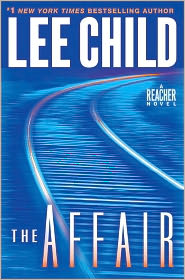 I actually had a tough time figuring out which genre to place this one in, as it takes place in the future, which would make it Science Fiction, but it's about mythical/mystical creatures, so perhaps it's Fantasy. Since it didn't take place in a big city, I discarded Urban Fantasy. Whatever it is, it's a fresh take on things, and a good read, such as I've come to expect from Faith Hunter, author of the Jane Yellowrock series.
I actually had a tough time figuring out which genre to place this one in, as it takes place in the future, which would make it Science Fiction, but it's about mythical/mystical creatures, so perhaps it's Fantasy. Since it didn't take place in a big city, I discarded Urban Fantasy. Whatever it is, it's a fresh take on things, and a good read, such as I've come to expect from Faith Hunter, author of the Jane Yellowrock series.The Apocalypse has already taken place, and the angels of the Most High came to Earth, bringing their plagues, and the wrath of the Four Horsemen of Revelation. So far, however, no Messiah has appeared to whisk away the faithful, and the Most High himself has not been heard from. The remaining population appears to be scattered, and are firmly under the wings and thumbs of the seraphic host. If anyone gets out of line, seraphs appear to wreak immediate vengeance. The seraphs also seem to be pretty non-denominational and non-judgemental, as far as people's religious practices are concerned, and in North America various sorts of fundamentalism have become deeply entwined with the secular governments, perhaps a bit like the most repressive times in early New England.
A result of one of the plagues was that a race of genetically different beings appeared - the neomages. They're not exactly human, and allegedly don't have souls, but they're able to work with the leftover energies of creation directly, and are allowed to contract with humans occasionally to move mountains or melt ice caps, and perhaps work some subtler magics, too. For some reason, they are brought into "mage-heat", a mating frenzy, whenever a seraph flies by, and if they fail to take the proper precautions they'll pretty well mate with any being in the neighborhood.
Neomages have been confined to special enclaves, where their special powers won't make them the target of jealous and superstitious humans, and where their mating can usually be controlled. If one of them mates with a seraph, another type of being is created - a kylen - which seems to be a type of half-human, half seraph, also able to use creation energies, I think, and very good in things martial. There's also some mules that are born to the wrong type of mating combos.
On the dark side (you thought it was all harps and singing all the time?), there are a group of evil beings - some of whom may be fallen seraphs, and some of whom may have just appeared at the same time, and others of whom have been bred by the evil masters. They tend to hide out underground during the daytime, only venturing forth in darkness to rape, murder, and terrify poor defenseless humans.
Ok, scene set.
Thorn St. Croix is a neomage. She escaped from (or perhaps was secretly sent away from for a purpose) one of the enclaves around the time she reached puberty, and raised by an "uncle" as a human. She must constantly maintain a glamour to conceal her true nature, as a) it is illegal for neomages to live among humans unless they have a (like a foreigner) visa issued by the seraphs, and b) humans fear and despise neomages, and will torture and kill them when captured. Despite all this, Thorn has successfully survived in a small town in the Rockies, as the proprietor of a jewelry manufacturing operation, in which she has several partners, and even was married to a human for a short time, until her husband cheated on her.
Things begin to come a little unraveled when her ex-husband is beaten and kidnapped, and she falls under suspicion. The investigator who arrives, Thaddeus, turns out to be a kylen (he doesn't know he's one, though - his mother cast a geas on a ring he wears constantly that keeps him from fully assuming his half breed form, and he wasn't told about his background). Kylen evidently cause neomages to go into mage-heat, too, so Thorn's interrogation is doubly uncomfortable for her.
There are more surprises in store for Thorn when it turns out that one of her partners, Audric, who is also the lover of another partner, Rupert (both more or less male, and Rupert is her ex-brother-in-law...getting confused yet?), is one of the mules, and a powerful practitioner of martial arts. Thorn always just thought he was a very successful scavenger, digging up "treasures" from the ruined cities of the Apocalypse.
In order to clear her name, and make her adopted daughter, Ciana, happy, Thorn agrees to try to find and rescue her ex, Lucas, from the dark powers that have kidnapped him and hold him prisoner under the earth.
It's a wonderful thing to finally have some adventures take place in a NEW type of post-apocalyptic venue. Lots of plots, counter plots, wicked agendas, and cussed folks make this book a delight.












